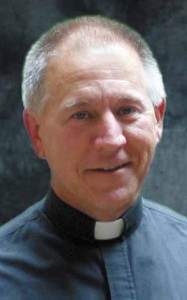By Fr. Bud Grant
Let me start with an overdue correction. I just discovered an old voice-mail message in reference to my article for January 2015 in which I made two sloppy references. First, I suggested that “farm chemicals” contribute to the dead zone in the Gulf of Mexico. I should have been more precise: Scientific American’s “Earth Talk” (9.12.12) says that excess nutrients from farm fields are the culprit. Secondly, I stated that steroid use in livestock makes human antibiotics less effective. I should have said that antibiotics in livestock reduce their efficacy in humans, according to the FDA. Steroid use is approved by the FDA for beef cattle and sheep. I apologize for these mistakes and thank the reader who pointed them out to me.

The issues, hopefully corrected, are relevant to the discussion of “Laudato Si,” since the Holy Father talks about our relationship with the rest of creation and of his fear of “unbridled exploitation” (67) largely justified by “an undifferentiated and one-dimensional” technocratic paradigm (106), the themes of chapters two and three.
Here the pope makes his most fundamental claim: “in this universe … we discern countless forms of relationship and participation” (79). Humans, while unique, are part of that creation (81). “All creatures are moving forward with us and through us towards a common point of arrival, which is God” (83). Francis is not naively romantic in his portrayal of humans experiencing “a deep communion with the rest of nature” (91). Rather, he balances two dimensions of that relationship. The first is a peculiarly Christian ecocentrism: nature has intrinsic value quite apart from its usefulness. Such a claim, I think, can only be justified on the grounds that nature — with us — is created by God (65ff). So, creation ought to be cared for not only because it provides valuable resources, but simply because it is (77). “We are not God. The earth was here before us … we must forcefully reject the notion that our … dominion over the earth justifies absolute domination over other creatures” (67).
The second, legitimately anthropocentric, dimension of our relationship is that Creation does provide us, as the most “transcendent” of God’s creatures (81), with the resources needed for communal human flourishing. Such use must be responsible and rational — that is in accord with the “laws of nature and delicate equilibria” so that we do not destroy that which provides our needs (68). Furthermore, resources are a “shared inheritance … meant to benefit everyone” (93). Private property (e.g., exclusive rights to resources) is not an absolute or inviolable right; the poor must be provided for. “The natural environment,” he says, “is a collective good … for the good of all (95). Powerful stuff, yet this is not new, much less “socialist,” teaching. It is directly in line with the long tradition of the “Social Encyclicals” going back to 1891.
With Chapter 3 the pope again risks being accused of technophobic romanticism. Certainly, he is afraid; anyone who studies the environment these days is frightened. Yet his argument is dispassionately rational: just because technology allows us to do something does not mean that we ought to do it. Technological power driven only by desire for economic “progress” (105, 109) without moral constraints is destructive (107). Technology, according to ethicist Hans Jonas, has become something of a Frankenstein — making it possible, for the first time in human history, for humanity to destroy itself. We ought not do that.
The key to overcoming a myopic-fixation technology is relationship with the created world, to one another, and to God (119). This perspective is gained by drawing on an ethic, culture and spirituality of “self-restraint” (105). Without it, then, we do succumb to a “romantic individualism” of “stifling immanence” (119); with it, “all those affected” including farmers, can decide how technology ought to be used “for the common good, present and future” (135).
(Father Bud Grant is a professor of theology at St. Ambrose University in Davenport.)











